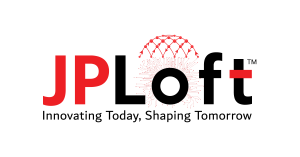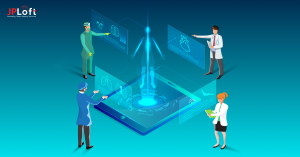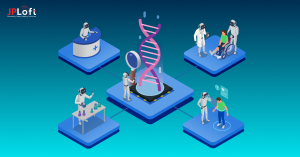JPLoft Expands Service Portfolio with Custom AI in Healthcare Solutions for Hospitals and Startups
JPLoft delivers AI in healthcare solutions that streamline workflows, personalize patient care, and drive innovation in the digital health space.
AI in healthcare is here to stay. It’s time for startups and hospitals to level up, which is why we’re offering custom AI solutions to help them innovate and grow faster.”
DENVER, CO, UNITED STATES, June 30, 2025 /EINPresswire.com/ -- As the global healthcare sector continues to embrace artificial intelligence, JPLoft, a trusted name in digital transformation, is expanding its capabilities to deliver tailor-made AI-driven solutions to healthcare startups, hospitals, and medical institutions. — Rahul Sukhwal
This strategic shift highlights the growing demand for intelligent, scalable applications that can help healthcare providers offer faster, smarter, and more personalized patient care.
From AI-powered diagnostics and telemedicine to predictive analytics and virtual assistants, the demand for intuitive digital healthcare experiences is at an all-time high.
JPLoft’s healthcare initiatives reflect the direction the industry is heading: accessible, intelligent systems built with flexibility, compliance, and user experience at their core.
A Growing Demand for AI in Healthcare
Over the past few years, artificial intelligence has moved from being an experimental technology to a critical part of modern healthcare delivery.
Hospitals and startups alike are seeking AI-based solutions to reduce administrative overhead, assist in clinical decisions, and improve the overall quality of care.
Whether it’s early disease detection or chatbot-led symptom checkers, AI technologies are reshaping patient interactions.
This demand has opened the door for developers who can translate complex medical needs into usable digital products.
Companies like JPLoft have taken on this challenge by bridging the gap between emerging technologies and healthcare systems in need of modernization.
JPLoft’s work with healthcare organizations showcases how AI is solving real-world problems.
Their team has developed AI-powered image analysis tools that assist radiologists in making quicker, more accurate assessments.
The global health tech market is projected to grow at a CAGR of over 22.2% through 2030. AI is at the centre of this growth, especially in patient data analysis, operational management, and remote care delivery.
With healthcare spending expected to top $10 trillion globally, digital health investments are becoming indispensable.
Key Trends Driving AI in Healthcare
AI in healthcare services is not just about replacing human input; it’s about enhancing it.
Technologies such as machine learning, natural language processing, and computer vision allow applications to interpret complex data sets in real time.
This is essential in clinical environments where timely decisions can be the difference between life and death.
Some of the most promising areas of AI adoption include:
• Predictive Analytics: Hospitals are using AI to forecast patient deterioration, optimize staffing, and manage bed occupancy rates.
• AI in Imaging: Tools that assist with reading MRIs, CT scans, and X-rays are improving diagnostic accuracy while reducing turnaround time.
• Virtual Health Assistants: Chatbots and voice assistants are supporting triage, follow-ups, and appointment scheduling.
• Personalized Care: AI tailors treatment plans based on patient history, genetic data, and real-time vitals.
JPLoft’s approach to developing healthcare apps is deeply informed by these trends.
By combining technical agility with an understanding of medical requirements, the company has positioned itself as a strategic partner for health tech innovators.
In addition to the above, clinical decision support tools are using AI to recommend treatments based on vast databases of clinical research and case studies.
These tools help bridge the knowledge gap between cutting-edge research and day-to-day practice.
Not Just an App: Building Scalable Healthcare Ecosystems
In today’s healthcare environment, building a mobile or web app isn’t enough.
Providers need scalable, secure, and interoperable platforms that can adapt to changing needs and integrate with existing systems.
JPLoft addresses this by offering end-to-end development support from ideation and prototyping to deployment and post-launch optimization.
For example, one of its recent projects involved developing an AI-enabled telehealth platform that supports multilingual video consultations, real-time symptom analysis, and EMR synchronization.
The platform now serves thousands of patients across rural and urban regions, reducing physical clinic loads while increasing access to care.
As a healthcare app development company, JPLoft prioritizes compliance with international standards such as HIPAA, GDPR, and HL7 to ensure privacy, data protection, and system compatibility.
The company also develops modular systems, platforms that can grow with providers over time.
These are particularly useful for startups and clinics with constrained budgets, allowing them to adopt features in phases while ensuring scalability.
Human-Centered Innovation
Despite the technological complexity involved, JPLoft remains committed to human-centered design.
It regularly collaborates with clinicians, nurses, and healthcare administrators to understand day-to-day workflows.
This insight informs intuitive UX design, role-based access controls, and dashboards that align with user needs rather than forcing adaptation.
According to the JPLoft development team, the goal is to create tools that feel like a natural extension of the clinical workflow.
One developer noted, “Technology should reduce friction, not add to it. Our AI systems are built to support, not overwhelm, frontline staff.”
This philosophy has helped the firm achieve strong adoption rates for its healthcare solutions, even among non-tech-savvy users.
Case studies show that involving medical personnel from the design stage significantly increases the likelihood of a product’s success.
JPLoft emphasizes co-creation in their projects, fostering a sense of ownership and long-term engagement among end-users.
Expanding Global Partnerships
JPLoft’s healthcare innovations have also attracted attention from international markets.
The company has recently entered into partnerships with health tech accelerators in Southeast Asia and the Middle East to co-develop localized AI tools.
These efforts are aimed at addressing region-specific challenges, such as language barriers, healthcare accessibility, and digital infrastructure limitations.
Through these collaborations, JPLoft is contributing to healthcare equity by helping underserved communities gain access to AI-based services.
Multilingual interfaces, offline functionality, and mobile-first design are central to these solutions.
A Look Ahead: AI's Expanding Role in Healthcare
Looking forward, the integration of AI is expected to deepen, with advancements in generative AI, predictive diagnostics, and robotic surgery systems.
JPLoft is already exploring applications of generative models to create adaptive care plans, simulate patient outcomes, and even assist with medical education.
In one prototype, the company is experimenting with an AI-based rehabilitation assistant that monitors patient recovery through video analysis and provides real-time feedback.
While still in early testing, this tool demonstrates the potential of AI beyond administrative tasks and into therapeutic support.
The healthcare industry is not standing still, and neither is the technology behind it.
Strategic partnerships between healthcare providers and experienced tech developers will be key to unlocking the next wave of innovation.
The integration of wearable technology with AI analytics is also on the horizon.
JPLoft’s trajectory in this space aligns with its broader vision as a top startup app development company committed to solving real-world healthcare challenges with intelligent technology.
Case Study: WellTra.Ai – Personalized Wellness at Scale
One standout success among JPLoft’s recent healthcare projects is WellTra.Ai, an innovative platform redefining personal wellness through the power of affective AI.
Developed in collaboration with JPLoft’s AI engineering team, WellTra.Ai leverages emotional intelligence and real-time health analytics to deliver a highly personalized wellness journey for its users.
By interpreting user sentiment, stress levels, and behavioural patterns, WellTra.Ai provides adaptive wellness suggestions from mental health check-ins to lifestyle recommendations.
JPLoft helped build this advanced AI model into a scalable, mobile-first product now used by thousands of individuals to track their emotional and physical well-being.
The platform’s unique value lies in its affective AI technology designed to sense and respond to human emotions bridging the gap between health tech and empathy.
By partnering with WellTra.AI, JPLoft has showcased how advanced personalization can lead to more engaged users and better health outcomes.
This case further underlines JPLoft’s capability to translate cutting-edge AI research into real-world applications tailored for human impact.
Educating the Healthcare Workforce
To ensure successful adoption, JPLoft is also investing in training modules for healthcare workers.
These include in-app tutorials, simulation environments, and onboarding workshops that empower medical professionals to use AI tools effectively.
The company believes that technology is only as useful as the people who operate it.
By building AI solutions that are intuitive and supported with learning infrastructure, JPLoft aims to reduce resistance to change and improve long-term outcomes.
About JPLoft
JPLoft is proud to contribute to the evolution of AI solutions in healthcare and strives to remain the preferred technology partner for global medical innovators.
With more than a decade of experience and 1,100+ successful projects, the company specializes in crafting intelligent applications tailored to business-specific goals.
In the healthcare domain, JPLoft brings together cross-functional teams with expertise in AI, cloud computing, mobile development, and security compliance.
At a Glance:
• 130+ Employees Strong
• 10+ Years of Expertise
• 1100+ Projects Delivered
• 70+ Active Clients Worldwide
By combining clinical insight with engineering excellence, JPLoft continues to drive meaningful impact in the digital health space.
Conclusion
As AI technology redefines the boundaries of what's possible in healthcare, companies that fuse innovation with empathy will lead the next wave of transformation.
JPLoft has demonstrated through projects like WellTra.AI and its wider healthcare portfolio that it’s not just building apps, it's shaping a smarter, more connected future for global wellness.
By remaining focused on scalability, compliance, and end-user needs, JPLoft continues to prove its value as a long-term technology ally for startups and enterprises in the healthcare domain.
With expertise that spans platforms, disciplines, and industries, the company is ready to help shape AI-driven healthcare solutions that are impactful, inclusive, and future-ready.
Rahul Sukhwal
JPLoft
+1 303-335-0405
sales@jploft.com
Visit us on social media:
LinkedIn
Instagram
Facebook
YouTube
X
Legal Disclaimer:
EIN Presswire provides this news content "as is" without warranty of any kind. We do not accept any responsibility or liability for the accuracy, content, images, videos, licenses, completeness, legality, or reliability of the information contained in this article. If you have any complaints or copyright issues related to this article, kindly contact the author above.



